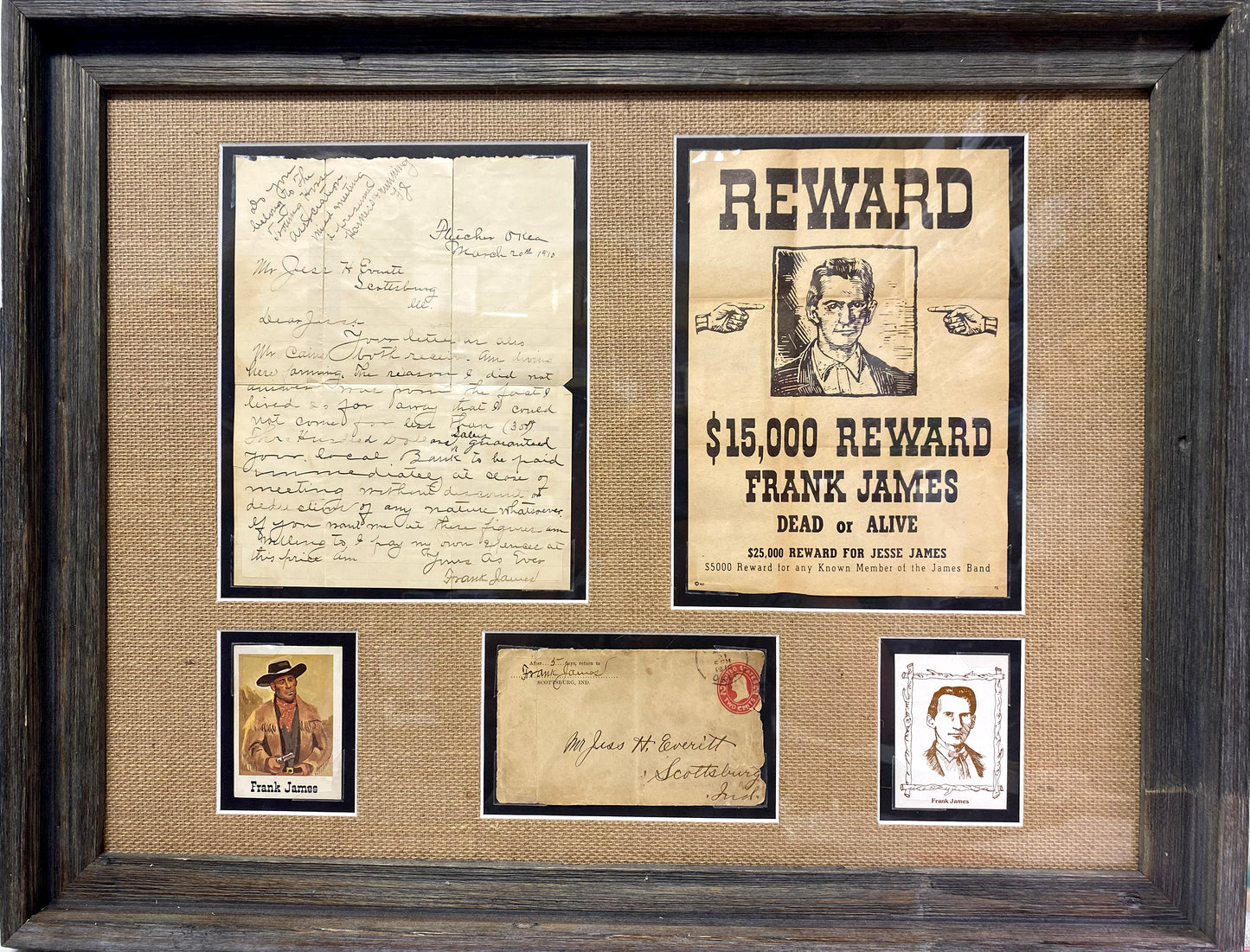America's Auction Channel
Antique 1910 Frank James Outlaw Letter and Legacy of the Everitt Family
Antique 1910 Frank James Outlaw Letter and Legacy of the Everitt Family
Regular price
$25,000.00 USD
Regular price
Sale price
$25,000.00 USD
Unit price
per
Shipping calculated at checkout.
Couldn't load pickup availability
Antique 1910 Frank James Outlaw Letter and Legacy of the Everitt Family
framed-21in x 27in
This appears to be a handwritten letter from 1910 from Frank James to Mr/ Jesse H. Everitt. The letter is about a transaction of some sort, possibly involving horses/ harnesses. It mentions the price of $300 and guarantee for payment at local bank. The letter also mentions a meeting and willingness to pay a certain price. After retiring from his outlaw life, Frank James was involved in horse racing and breeding. He and Jesse James dealt in fine-blooded stock, raced Thoroughbreds, and rode American Saddlebreds. Horses were essential to their operations, both during their outlaw years and afterward, when Frank lived a quieter life.
Frank James was the oldest of three children, born to Reverend Robert Sallee James and Zerelda (Cole) James in Kearney, Missouri.
His siblings included:
Jesse James (1847–1882) – The infamous outlaw and leader of the James-Younger Gang.
Susan Lavenia James (1849–1889) – Frank and Jesse’s younger sister, who lived a quieter life away from crime.
After their father died in 1850, their mother remarried Benjamin Simms in 1852, but he passed away soon after. She later married Dr. Reuben Samuel in 1855, who became a stepfather to Frank and his siblings.The James family was deeply involved in Confederate sympathies, and Frank fought in the Civil War before turning to outlaw life alongside Jesse.
During the Civil War, Frank fought for the Confederacy and became part of Quantrill’s Raiders, a notorious guerrilla group. After the war, he and Jesse formed the James-Younger Gang, robbing banks and trains across the Midwest. Unlike Jesse, Frank eventually surrendered in 1882 and was acquitted in court due to lack of evidence.
In later years, Frank lived a quiet life as a farmer, theater performer, and even a tour guide at the James family farm. He passed away on February 18, 1915.
Frank James was an American outlaw, Confederate soldier, and member of the infamous James-Younger Gang. Born: January 10, 1843, in Kearney, Missouri.Family: He was the older brother of Jesse James, another legendary outlaw.Civil War Involvement: Frank fought for the Confederacy and later joined Quantrill’s Raiders, a notorious guerrilla group.Outlaw Career: After the war, he and Jesse formed the James-Younger Gang, robbing banks, trains, and stagecoaches across multiple states.Surrender: Unlike Jesse, Frank eventually surrendered to authorities in 1882. He was tried for robbery and murder but was acquitted due to lack of evidence.Later Life: He retired to a quiet life, working as a farmer and tour guide at the James family farm.Death: He passed away on February 18, 1915, in Missouri.Frank James was less notorious than his brother but played a crucial role in shaping the outlaw legend of the American West.
Frank James began acquiring land after retiring from his outlaw life. Following his surrender in 1882, he lived a quieter existence, working as a farmer and even a tour guide at the James family farm, which had become a tourist attraction. His mother, Zerelda James, originally managed the site, but after her passing, Frank took over the business.While specific records of his land purchases are scarce, historical accounts suggest that he was involved in property dealings in Missouri and possibly other states.
The Everitt family of Scottsburg, Indiana, has deep historical roots dating back to the early 1900s. Among them was Jesse Howard Everitt, a man whose name appears in a signed letter from the notorious outlaw Frank James, dated March 20, 1910—likely concerning land dealings. This connection between a local figure and the famed James gang sheds light on the intricate web of relationships and business affairs following the outlaw era. With ties to cattle ranching and land ownership, the Everitts played their part in shaping the historical landscape of Scott County, Indiana.
All estate items may show wear and conditions pertinent to their individual time periods. Thus they are sold as-is where-is, no warranties expressed or implied and are non returnable and non refundable.
framed-21in x 27in
This appears to be a handwritten letter from 1910 from Frank James to Mr/ Jesse H. Everitt. The letter is about a transaction of some sort, possibly involving horses/ harnesses. It mentions the price of $300 and guarantee for payment at local bank. The letter also mentions a meeting and willingness to pay a certain price. After retiring from his outlaw life, Frank James was involved in horse racing and breeding. He and Jesse James dealt in fine-blooded stock, raced Thoroughbreds, and rode American Saddlebreds. Horses were essential to their operations, both during their outlaw years and afterward, when Frank lived a quieter life.
Frank James was the oldest of three children, born to Reverend Robert Sallee James and Zerelda (Cole) James in Kearney, Missouri.
His siblings included:
Jesse James (1847–1882) – The infamous outlaw and leader of the James-Younger Gang.
Susan Lavenia James (1849–1889) – Frank and Jesse’s younger sister, who lived a quieter life away from crime.
After their father died in 1850, their mother remarried Benjamin Simms in 1852, but he passed away soon after. She later married Dr. Reuben Samuel in 1855, who became a stepfather to Frank and his siblings.The James family was deeply involved in Confederate sympathies, and Frank fought in the Civil War before turning to outlaw life alongside Jesse.
During the Civil War, Frank fought for the Confederacy and became part of Quantrill’s Raiders, a notorious guerrilla group. After the war, he and Jesse formed the James-Younger Gang, robbing banks and trains across the Midwest. Unlike Jesse, Frank eventually surrendered in 1882 and was acquitted in court due to lack of evidence.
In later years, Frank lived a quiet life as a farmer, theater performer, and even a tour guide at the James family farm. He passed away on February 18, 1915.
Frank James was an American outlaw, Confederate soldier, and member of the infamous James-Younger Gang. Born: January 10, 1843, in Kearney, Missouri.Family: He was the older brother of Jesse James, another legendary outlaw.Civil War Involvement: Frank fought for the Confederacy and later joined Quantrill’s Raiders, a notorious guerrilla group.Outlaw Career: After the war, he and Jesse formed the James-Younger Gang, robbing banks, trains, and stagecoaches across multiple states.Surrender: Unlike Jesse, Frank eventually surrendered to authorities in 1882. He was tried for robbery and murder but was acquitted due to lack of evidence.Later Life: He retired to a quiet life, working as a farmer and tour guide at the James family farm.Death: He passed away on February 18, 1915, in Missouri.Frank James was less notorious than his brother but played a crucial role in shaping the outlaw legend of the American West.
Frank James began acquiring land after retiring from his outlaw life. Following his surrender in 1882, he lived a quieter existence, working as a farmer and even a tour guide at the James family farm, which had become a tourist attraction. His mother, Zerelda James, originally managed the site, but after her passing, Frank took over the business.While specific records of his land purchases are scarce, historical accounts suggest that he was involved in property dealings in Missouri and possibly other states.
The Everitt family of Scottsburg, Indiana, has deep historical roots dating back to the early 1900s. Among them was Jesse Howard Everitt, a man whose name appears in a signed letter from the notorious outlaw Frank James, dated March 20, 1910—likely concerning land dealings. This connection between a local figure and the famed James gang sheds light on the intricate web of relationships and business affairs following the outlaw era. With ties to cattle ranching and land ownership, the Everitts played their part in shaping the historical landscape of Scott County, Indiana.
All estate items may show wear and conditions pertinent to their individual time periods. Thus they are sold as-is where-is, no warranties expressed or implied and are non returnable and non refundable.
Materials
Materials
Shipping & Returns
Shipping & Returns
Dimensions
Dimensions
Care Instructions
Care Instructions


